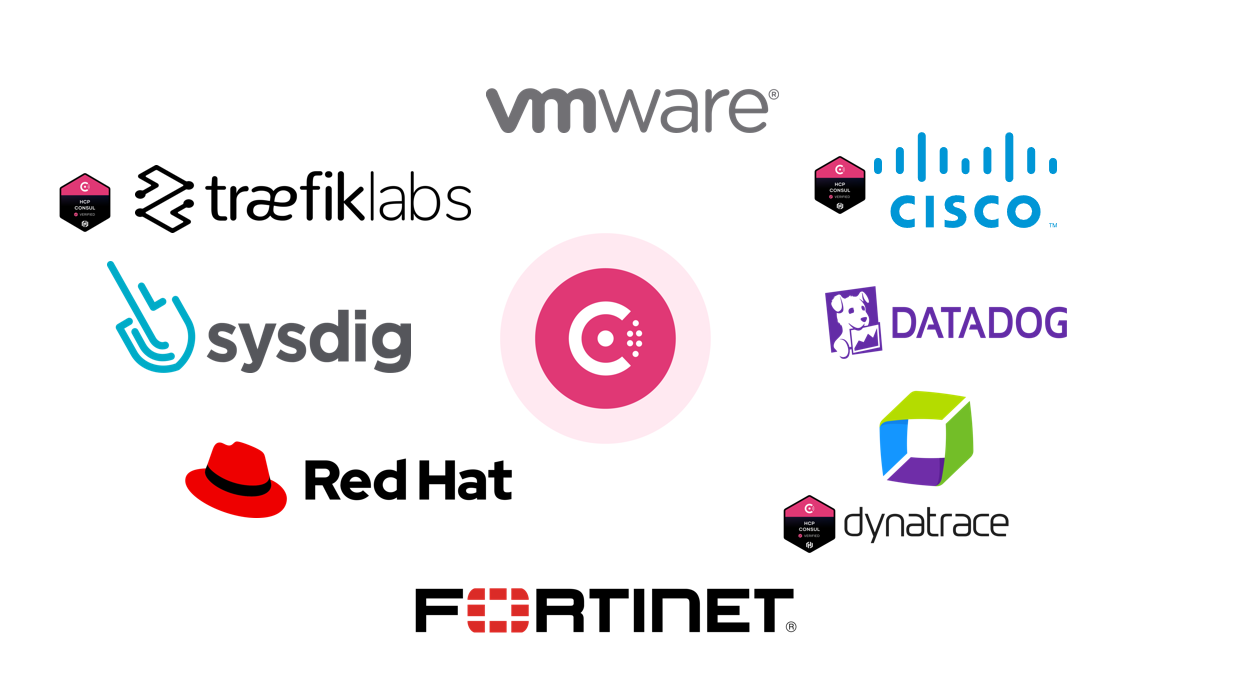Update: Effective November 2024, HashiCorp has deprecated HCP Consul Central (aka HCP Consul management plane) as part of an effort to streamline offerings and focus on delivering the best possible solutions to customers. This helps accelerate product development in other areas of Consul to meet customer demands. For information on the latest Consul features and capabilities, please go to our Consul product page
A trio of new HCP Consul verified integrations, three new Consul Enterprise integrations, and four new open source Consul integrations have been completed. The number of new Consul integrations have nearly doubled from the previous year as we continue to see strong partner lean-in on network infrastructure automation and observability integrations.
This blog post will introduce each of the 10 new integrations. In the graphic below, the HCP Consul Verified badge next to a logo indicates a product has been verified to work with HCP Consul.


»HCP Consul Verified Integrations
HCP Consul is a fully managed platform operated by HashiCorp that allows organizations to get Consul up and running quickly. We are pleased to announce the following existing integrations have now been verified to work with HCP Consul as well as Consul Enterprise and open source:
»Dynatrace
Dynatrace’s HCP Consul service mesh extension utilizes Consul's built-in StatsD export capability to collect metrics from non-Kubernetes Consul instances; both self-managed and HCP Consul-managed instances.
»Cisco AppDynamics
This integration sends telemetry data from HCP Consul to Cisco’s AppDynamics. HCP Consul’s integration with AppDynamics makes it easier for mutual customers to monitor the health of Consul clusters via AppDynamics.
»Traefik Labs
Traefik Proxy 2.6 adds its first round of support for Consul Enterprise and HCP Consul. This includes an experimental implementation of the namespace feature for the Consul K/V and Consul Catalog providers. This feature allows you to specify a target namespace other than the default namespace when connecting to Consul.
»Consul Enterprise Integrations
There have been three new Consul Enterprise-specific integrations recently. This means the integrations have been validated to work with Consul namespaces in addition to working with Consul open source features.
»Cisco
Cisco Secure and HashiCorp have partnered to enable network infrastructure automation for dynamic objects on FMC (Firepower Management Center) using HashiCorp's Consul-Terraform-Sync (CTS) tool.
»Fortinet
Fortinet has completed two Consul integrations. The first is the FortiManager CTS module, which dynamically executes network infrastructure automation tasks in FortiManager when triggered by service changes in the Consul services catalog. The second integration is the FortiOS CTS module, which automates FortiOS infrastructure in the same way as the first integration.
»Red Hat
Consul Container Universal Base Images (UBIs) are now certified on Red Hat. These are official Red Hat UBIs of Consul open source, Consul Enterprise, Consul on Kubernetes, and Consul on Kubernetes control plane
»Consul Open Source Integrations
There have been four new verified partner integrations specifically with Consul open source in recent months.
»Datadog
Datadog Network Performance Monitoring (NPM) now supports Consul networking with robust metrics reporting and network visualization for Consul deployments. Datadog NPM gives you visibility into your network traffic between services, containers, availability zones, and any other tag in Datadog.
»Sysdig
With Consul installed in your environment, the Sysdig agent will now automatically connect to it and collect an array of different metrics, letting you immediately see the health and performance of your Consul network.
»VMware
VMware has recently completed two integrations. The Consul TKG support integration allows applications to deploy and run Consul on VMware Tanzu Kubernetes Grid Mulitcloud, whereas the Consul TKGI support integration allows Consul to deploy and run on VMware Tanzu Kubernetes Grid Integrated Edition.
»HashiCorp Consul Integration Program
The HashiCorp Consul Integration Program allows partners to integrate their products to work with Consul CE or Enterprise. Learn more at our Consul Integration Program page.
As a fully managed service, HCP Consul is the easiest way to deploy managed Consul in AWS. For more information about HCP Consul and pricing, please visit the HCP product page or sign up through the HCP portal.
More Information on Earlier Consul Integrations:








